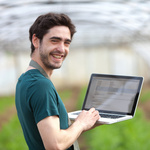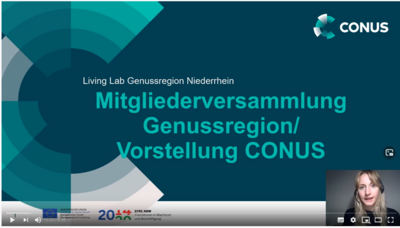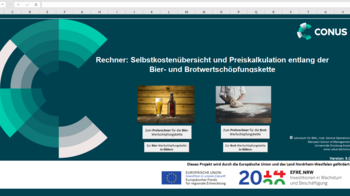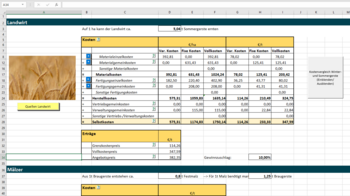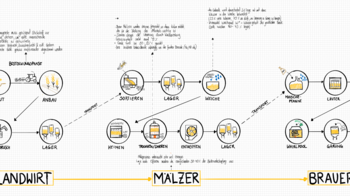Genussregion Niederrhein
Living Lab "Genussregion Niederrhein"
Vision
We want to promote the distribution of regional food through networking and innovative, digital ideas and thus strengthen local businesses economically. Sustainable supply chains connect urban and rural areas and make them easily available everywhere. In this way, the climate and environment are protected.
Mission
We use scientific methods and our expertise to support regional players in the Lower Rhine region in establishing regional cooperation and using modern, digital technologies. In this way, they can turn the side-by-side relationship between urban and rural areas in the region into a genuine link. Small and medium-sized enterprises are strengthened economically and can shape an environmentally friendly, sustainable and safe food supply. For example, joint logistics make it possible to bundle delivery routes. A cooperative local store in Düsseldorf opens up new customer groups. A fulfillment platform simplifies the digital direct sale of food for both suppliers and customers. Pricing/sales tools and workshops enable suppliers to set fair, viable yet marketable prices and to advertise their products appropriately, for example on social media. All topics are dealt with in a direct, constant exchange at eye level together with the businesses in the region.
Subprojects
Structure of the Network
A Living Lab thrives on a continuous exchange with all stakeholders in the region. We want to do something for the region and therefore need to get to know the region and the regional producers and their current situation with current challenges and opportunities. Together, we want to develop solutions that can be implemented in practice. In order to engage in an exchange, it is important to be visible in the region. An important partner in this context is Verein Genussregion Niederrhein e.V., which brings together various producers from the region. We introduced ourselves to these producers by means of a video at the general meeting of the Genussregion Niederrhein association.
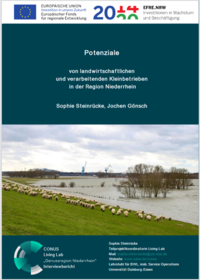
Interviews
Over a period of 3 months, we conducted qualitative telephone interviews with 41 companies and were thus able to get to know and understand the current situation of the companies better. These interviews helped us to identify further subprojects and gain supporters for the subprojects. Through a combination of open exchange and targeted questions, the survey provided a comprehensive overview of the companies and revealed the areas in which there is potential for optimization and support. Among other things, the companies would like support with their own online presence and, in some cases, with setting up online stores. The implementation of logistics for new sales and distribution channels is a problem area and prevents businesses from establishing themselves. Help with pricing is also welcome.
We have published the results of the intervies in the report "Potenziale von landwirtschaftlichen und verarbeitenden Betrieben in der Region Niederrhein".
More InformationBeer and bread price calculator
In this subproject, the Living Lab team is working closely with the EU-funded "Korn B" project. This project focuses in particular on two completely regional products - beer and bread. The summer grain varieties grown for this purpose have a particular advantage in terms of sustainability and water protection. However, the yield is considerably lower compared to winter grains. In order to make cultivation attractive for farmers, the costs and yields along the entire value chain must be considered and the prices of the products adjusted if necessary.
The SO chair developed a price calculator for the calculation, in which the costs can be entered manually. Based on discussions with relevant actors and in-depth research, relevant costs and revenues were identified and prices calculated for all stages along the value chain. If you are interested in the price calculator, please send an e-mail to jochen.goensch@uni-due. We will then send you the price calculator.
Pooling delivery routes
Many small producers in the Lower Rhine region currently still rely on supplying customers themselves. As a result, however, many delivery routes are undertaken with small delivery quantities. This leads to high costs and time consumption. In this context, the CONUS team works closely with the regional suppliers of the Edeka project “Aus bester Nachbarschaft”, in which products from businesses in the neighborhood (max. 30 km from the market) are offered on “regional shelves”. In order to reduce the number of delivery routes and thus save costs, the CONUS project team is working together with Edeka and the suppliers of the Edeka location in Wesel “Wabe 241” to pool transport routes. We are currently in individual discussions with the suppliers to discuss implementation ideas in detail.
Series of Workshops
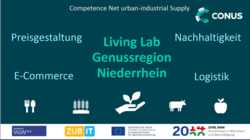
In the course of our project and the ever-increasing exchange with regional actors, it has become clear that producers are interested in revisiting certain key topics in greater depth. The Living Lab team is therefore offering a series of workshops on various topics, which will be led by the team's respective experts. Possible topics include IT, pricing, sustainability and logistics. The SO team will lead the Pricing workshop in particular.
The first workshop in the workshop series took place on May 3. from 3 to 5 pm. The workshop brought together businesses and association representatives to find out more about the topic of “Online marketing for regional food producers”. If you are interested in the presentation of the event, please contact genussregion (at) conus.nrw. The next workshop will take place at the end of June/beginning of July on the topic of logistics/micrologistics. Information will be available here shortly.
Cooperative stationary store

The “Genussregion Niederrhein” brand has built up a high profile in the Lower Rhine region thanks to its own events and annual markets, among other things. One of the association's aims is to become known beyond the region through a local store in Düsseldorf. The association approached the Living Lab team with this idea. A business concept for such a local store is to be developed together. The first step was a workshop in which other concepts were discussed in addition to the idea of a local store. The concepts, which included shop-in-shop concepts, weekly markets and supermarkets on wheels, were discussed and evaluated based on their feasibility. However, the outcome of the workshop was to continue to pursue the idea of the local store. In a second workshop, the topic was discussed further and the Mahnke Group was brought on board as a valuable partner.
Final Theses
As part of the CONUS project, we regularly invite students to write their theses on the topics of supply chain management, logistics, revenue management and sustainability. For example, master's student Mr. Christoph Krause successfully completed his master's thesis in cooperation with the e-food start-up Frischepost on the topic of “Sustainable route planning for e-food platforms”. You can download a summary of the master's thesis, including an additional report that examines the potential of bundling the delivery routes of two e-food platforms, here.
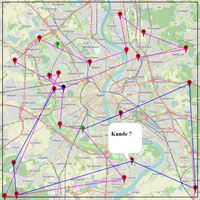
Contact
| Processing | Contact | |||
 | M.Sc.Sophie Steinrücke |  | Prof. Dr.Jochen Gönschjochen.goensch@uni-due.deRaum: LC011Telefon: +49 203 37-94369 | |


